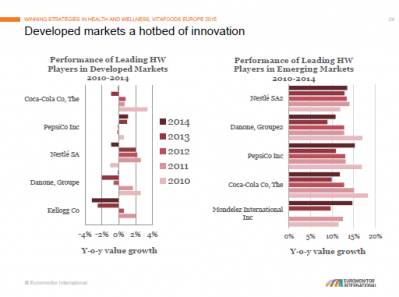SPECIAL EDITION: INFANT NUTRITION
Asia-Pacific baby formula sales boom despite scandals

The data, which covers the period 2009-2014, shows that Hong Kong saw 35.4% compound annual growth rate, with China showing 21.6% CAGR.
Saudi Arabia saw 18.6% growth in sales of formula, Vietnam 17.6% and Indonesia 14.3%.
Lianne van den Bos, Food Analyst at Euromonitor said that while sales in emerging markets were buoyant, the West European and North American average lies at just 1% value growth.
She told DairyReporter.com that rising incomes in these new markets mean that parents are able to buy milk formula not only for their infants but also for toddlers – something that was not affordable to previous generations.
She commented: “The consumption of milk formula in Asia Pacific is booming and brand loyalty and recommendations from family and friends, as well as the large baby population, are likely to continue to reinforce sales of milk formula.”
Product safety
Product safety was number one on the agenda of Chinese parents, she said.
Scandals with domestic companies have led for a booming demand for international brands, and lately a number of food scandals related to imported baby food brands were exposed too.
“This shook consumer confidence in imported baby food products, which were formerly considered to enjoy guaranteed food safety and quality. Additionally, it further pushed new mothers to choose breastfeeding over formulas. As a result the government has tightened legislation on both domestic as well as imported milk powder in order to restore faith," van den Bos continued.
She added that the number of joint ventures is increasing where Chinese companies are partnering up with large dairy internationals in order to benefit from their expertise.
And some Chinese retail stores have launched insurance for purchases to protect consumers against tainted foods and boost sales. If a product gets recalled by the manufacturer, the customer can claim money back.
For example, retailer Suning Redbaby has teamed up with one of China's largest insurers, Ping An, to have all infant formula products sold through the chain insured. The policy stipulates that if a brand of milk powder is recalled, customers who bought from the retailer’s stores or website would be paid compensation.
Special diets
Within the infant nutrition market, special baby milk formula remained the fastest-growing product category in 2014, with 31% current value growth, thanks to the increasing demand for allergy treatment and allergy prevention for newborns.
Hypoallergenic formula and lactose free powder formula sales are in strong in China. In addition, many products also benefit from the increasing focus on addressing specific conditions, such as digestive problems among premature babies.
In 2014, Nestlé (China) Ltd and Mead Johnson (Guangzhou) Ltd were the two leading companies in the special baby milk formula category, offering a full range of special baby milk formula products as well as professional advice and tracking services, according to Euromonitor data.
4% price rise
Euromonitor figures also show that the average unit price increased 4% in current value terms in 2014.
The growth resulted from two contradicting forces, it says. In July 2013, the anti-trust bureau of the National Development and Reform Commission (NDRC) launched an anti-trust investigation on some foreign operators, including Mead Johnson (Guangzhou) Ltd, Shanghai Wyeth Nutritional Co Ltd, International Nutrition Co Ltd, Abbott Nutrition International (China) and Royal FrieslandCampina NV, as well as domestic Biostime International Holdings Ltd, which allegedly sold baby milk formula at higher prices in China.
This was supposed to lead to lower pricing, but the manufacturers then consolidated and reshuffled their main product lines, reducing the proportion of low-end products and re-launching updated formulas of high-end products with an even higher price.
The main players benefit from this strategy by attracting consumers looking to trade up, offsetting the harsh fines imposed by the Government as well as the rising cost of raw materials, labour and transportation.
















